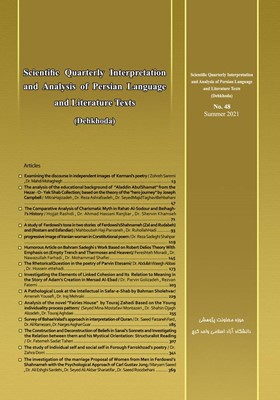The RhetoricalQuestion in the poetry of Parvin Etesami
Subject Areas : Persian language and literature texts
Abdollah Vasegh Abbasi
1
*
![]() ,
Hosein Ettehadi
2
,
Hosein Ettehadi
2
1 - Associate Professor, Department of Persian Language and Literature, Sistan and Baluchestan University, Sistan and Baluchestan, Iran.
2 - Assistant Professor, Department of Persian Language and Literature, Zabol Branch, Islamic Azad University, Zabol, Iran.
Keywords: Secondary Expression, Meaning, RhetoricalQuestion, Parvin Etesami, rhetoric,
Abstract :
In semantic science, sentences have a secondary meaning in addition to their apparent meaning, which is Latent and the main purpose of the speaker. A bunch of these sentences that are not be able to clarify as true and false. The main purpose of rhetoricalQuestion is to find out about the unknown, but the scholars have cited numerous secondary implications for it. In this study, the secondary concepts of questioning sentences in Parvin Etesami's Divan have been studied based on the descriptive-analytical method. It should be said that in the Parvin's Divan, 964 questions were used, of which 943 were rhetorical. For this number of rhetoricalQuestion, 41 different secondary concepts can be considered. Topics such as reproach, denial, forbiddance and complaint are most commonly used. All of these are well suited for expressing ethical issues. One of Parvin's stylistic features in the rhetorical uses is to combine the rhetorical sentences with the equilibrium array. In these cases, the poet repeats a moral theme in two consecutive terms. This style, in addition to enhancing the musical values of the word, has a greater impact on the poet's intended themes.
آرزو، سراجالدین علیخان (1381) عطیّة کبری موهبت عظمی، مقدمه و تصحیح سیروس شمیسا، تهران: فردوس.
آرین پور، یحیی (1382)از نیما تا روزگار ما، تهران: زوّار.
اعتصامی، پروین (1385)دیوان، بر اساس طبع ابوالفتحاعتصامی، به کوشش ولی الله درودیان، تهران: نشر نی.
باطنی، محمدرضا (1383)توصیف ساختمان دستوری زبان فارسی، تهران: امیرکبیر.
بهار، محمدتقی (1371)بهار و ادب فارسی، به کوشش محمد گلبن، تهران: شرکت سهامی کتاب های جیبی.
جرجانی، عبدالقاهر (1383) دلائل الاعجاز فی القرآن، ترجمه و تلخیص سیدمحمد رادمنش، اصفهان: انتشارات شاهنامه پژوهی.
حمیدیان، سعید (1383)در ادب فارسی، تهران: قطره.
رجایی، محمدخلیل (1376)معالم البلاغه، شیراز: انتشارات دانشگاه شیراز.
رضانژاد، غلامحسین(1367)اصول علم بلاغت، تهران، انتشارات الزهراء.
زرّین کوب، عبدالحسین (1383)از گذشتة ادبی ایران، تهران: سخن.
سیوطی، جلال الدین عبدالرحمن (1389)الاتقان فی علومالقرآن، ترجمة سیدم هدی حائری قزوینی، تهران: امیرکبیر.
شمیسا، سیروس (1379)معانی، تهران: میترا.
شیرازی، احمدامین (1375)آیین بلاغت، جلد دوم، قم: حوزة علمیّه.
صبور، داریوش (1382)بر کران بیکران، تهران: سخن.
ضیف، شوقی (1390)تاریخ و تطوّر علوم بلاغت، ترجمة محمدرضا ترکی، تهران: سمت.
عرفان، حسن (1395)کرانه ها شرح فارسی مختصرالمعانی، جلد سوم، قم: هجرت.
کزّازی، میرجلالالدین (1380)زیباشناسی سخن پارسی(معانی)، تهران: نشر مرکز.
وحیدیان کامیار، تقی (1379)بدیع از دیدگاه زیبایی شناسی، تهران: انتشارات دوستان.
همایی، جلال الدین (1374)معانی و بیان، تهران: نشر هما.
_||_Arezoo, Sirajuddin Ali Khan (2002) The Great Gift of the Great Gift, Introduction and Correction by Sirus Shamisa, Tehran: Ferdows.
Arianpour, Yahya (2003) From Nima to our time, Tehran: Zovar.
Etesami, Parvin (2006) Divan, based on the nature of Abolfath's Etesami, by the efforts of Valiullah Droudian, Tehran: Ney Publishing.
Bateni, Mohammad Reza (2004) Description of the grammatical structure of the Persian language, Tehran: Amirkabir.
Bahar, Mohammad Taghi (1992) Bahar and Persian Literature, by Mohammad Golban, Tehran: Pocket Books Company.
Jorjani, Abdul Qahir (2004) The Evidence of Miracles in the Qur'an, translated and summarized by Seyyed Mohammad Radmanesh, Isfahan: Shahnameh Pajoohi Publications.
Hamidian, Saeed (2004) in Persian Literature, Tehran: Qatreh.
Rajaei, Mohammad Khalil (1997) Ma'alem al-Balaghah, Shiraz: Shiraz University Press.
Rezanejad, Gholam Hossein (1988) Principles of Rhetoric, Tehran, Al-Zahra Publications.
Zarrinkoob, Abdolhossein (2004) From the Literary Past of Iran, Tehran: Sokhan.
Siouti, Jalal al-Din Abd al-Rahman (1389) Al-Atqan Fi'lum al-Quran, translated by Sayyid Mehdi Haeri Qazwini, Tehran: Amirkabir.
Shamisa, Sirus (2000) Meanings, Tehran: Mitra.
Shirazi, Ahmad Amin (1996) Rite of Rhetoric, Volume II, Qom: Seminary.
Saboor, Dariush (2003) On the Infinite Boundary, Tehran: Sokhan.
Zeif, Shoghi (2011) History and Evolution of Rhetoric Sciences, translated by Mohammad Reza Turki, Tehran: Samat.
Erfan, Hassan (2015) Borders Description Persian Summary, Volume 3, Qom: Hijrat.
Kazazi, Mir Jalaluddin (2001) Aesthetics of Persian speech (meanings), Tehran: Markaz Publishing.
Vahidian Kamyar, Taghi (2000) Innovative from an aesthetic point of view, Tehran: Dostan Publications.
Homayi, Jalaluddin (1995) Meanings and Expression, Tehran: Homa Publishing.

